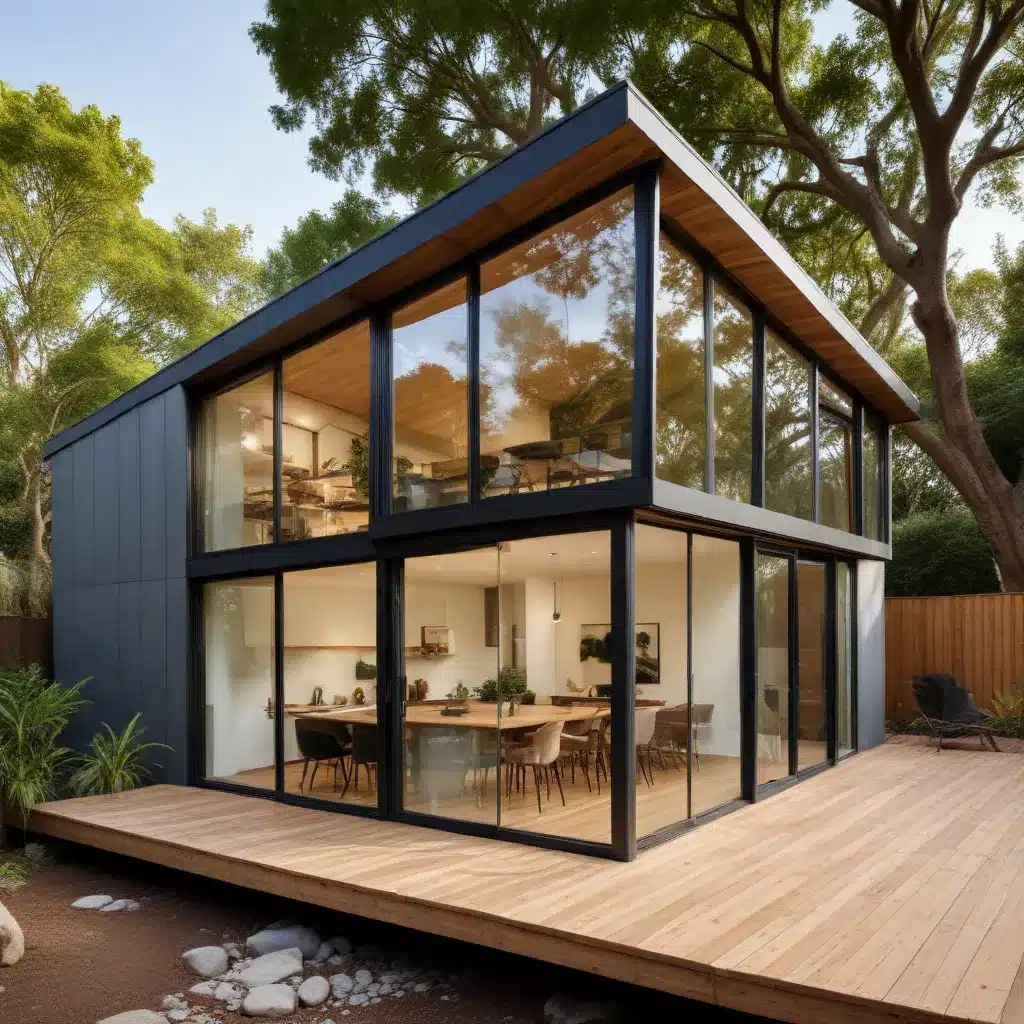
As an experienced home extension consultant, I’m excited to explore the world of sustainable home extensions with you. In today’s climate-conscious era, homeowners are increasingly seeking innovative solutions that not only enhance their living spaces but also reduce their environmental impact. That’s where modular and prefab home extensions come into play.
Modular Home Extensions
Modular construction has been a game-changer in the world of home building, and its benefits extend to home extensions as well. The key principle behind modular design is the use of factory-built, three-dimensional modules that are transported to the site and assembled to create the desired living space.
Modular Construction Principles
One of the primary advantages of modular construction is the precision and quality control that comes with off-site fabrication. In a controlled factory environment, the modules are engineered and built to the highest standards, ensuring a consistent level of craftsmanship that is often difficult to achieve with traditional on-site construction. This attention to detail translates into a more durable and energy-efficient extension, as the modules are designed to be airtight and well-insulated.
Modular Design Approaches
Modular home extensions offer a remarkable degree of customization. Homeowners can choose from a variety of floor plans, layouts, and even exterior finishes to create a seamless integration with the existing structure. The modular approach allows for a high level of flexibility, as the modules can be arranged in various configurations to suit the specific needs and constraints of the site.
Modular Customization Options
One of the standout features of modular home extensions is the ability to tailor the design to your unique preferences. From the selection of energy-efficient appliances and smart home technologies to the integration of sustainable materials and renewable energy sources, the modular approach empowers homeowners to create a truly personalized and eco-friendly living space.
Prefab Home Extensions
Prefabricated home extensions, on the other hand, offer a different approach to sustainable construction. These extensions are built off-site in sections or panels and then transported to the location for assembly.
Prefab Construction Methods
The prefab approach often relies on the use of structural insulated panels (SIPs) or other pre-engineered components that are manufactured in a controlled factory setting. This not only streamlines the construction process but also ensures a higher level of quality control and material efficiency, reducing waste and minimizing the environmental impact.
Prefab Design Considerations
Prefab home extensions provide a wide range of design options, from contemporary to traditional styles. Homeowners can work closely with the prefab manufacturer to select the perfect materials, finishes, and features that complement the existing home and their personal aesthetic preferences.
Prefab Sustainability Features
Sustainability is at the core of prefab home extensions. These solutions often incorporate energy-efficient technologies, such as high-performance insulation, smart home systems, and renewable energy sources, to create a living space that is both comfortable and environmentally responsible.
Comparison of Modular and Prefab
When it comes to choosing between modular and prefab home extensions, there are several factors to consider.
Cost and Budget Considerations
Both modular and prefab solutions can offer cost-effective alternatives to traditional home extensions, as the factory-based construction methods often result in reduced material waste and labor costs. However, the specific pricing can vary depending on the project’s scope, site conditions, and the level of customization required.
Customization and Flexibility
Modular home extensions generally provide a higher degree of customization, allowing homeowners to tailor the design, layout, and features to their exact needs. Prefab solutions, while offering a range of options, may be slightly more limited in their flexibility.
Sustainability and Environmental Impact
Both modular and prefab home extensions are inherently sustainable, as they utilize resource-efficient construction techniques and incorporate eco-friendly materials and technologies. However, the level of sustainability can vary based on the specific manufacturer and the homeowner’s chosen options.
Home Extension Planning
When considering a sustainable home extension, whether modular or prefab, it’s essential to carefully plan the project from start to finish.
Site Evaluation and Preparation
Before embarking on your home extension journey, it’s crucial to thoroughly evaluate the site and its existing conditions. This includes assessing the available space, the structural integrity of the existing building, and any potential obstacles or constraints that may impact the construction process.
Regulatory and Permit Requirements
Navigating the regulatory landscape is a crucial step in any home extension project. Be sure to familiarize yourself with the local building codes, zoning regulations, and any necessary permits required for your modular or prefab extension. This will ensure a smooth and compliant construction process.
Project Management Considerations
Effective project management is key to the success of a sustainable home extension. Work closely with your modular or prefab provider to coordinate the delivery and installation of the components, as well as any necessary on-site preparation and finishing touches. Maintaining open communication and staying organized will help ensure a seamless and stress-free experience.
In conclusion, the world of sustainable home extensions is a fascinating and rapidly evolving landscape. Whether you choose to explore the precision and customization of modular construction or the efficiency and design flexibility of prefab solutions, the ultimate goal is to create a living space that not only enhances your daily life but also minimizes your environmental footprint. By carefully weighing the options and planning your project with care, you can embark on a journey towards a more sustainable and fulfilling home extension.
Remember, as an experienced home extension consultant, I’m here to guide you through every step of the process. Don’t hesitate to reach out if you have any questions or would like to discuss your specific home extension needs. Together, let’s create a home that reflects your values and respects the planet.
















